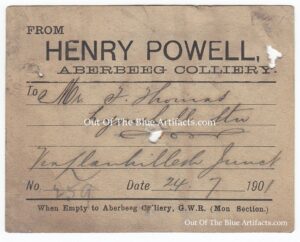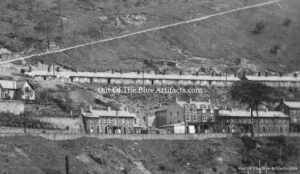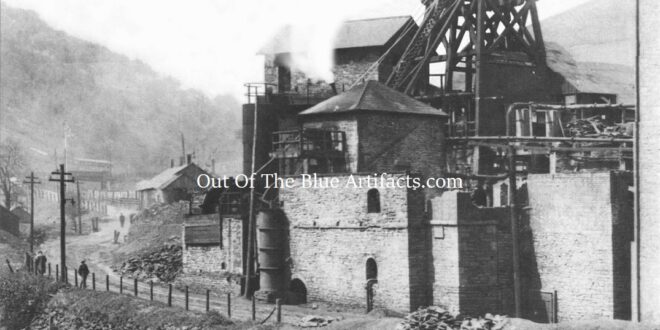The Aberbeeg Colliery
Aberbeeg Colliery (as seen in the image above) was located on the bank of the river Ebbw Fawr in the Cwm Valley, not far from the Hanbury Hotel, close to where the Fly-Over Garage is today.
The Sinking of the Colliery.
In 1860 the Aberbeeg Colliery was established and its sinking began under the ownership of Mr William Webb (Brewer & Maltster), Mr Thomas Spittle (Iron Founder) and Mr James Patrick. These three gentlemen formed the Aberbeeg Colliery Company. The mineral rights were leased to them by Messrs J. & C. Bailey of Nantyglo.
Mr James Patrick.
In December 1861 Mr James Patrick left the partnership.
Messrs William Webb and Thomas Spittle.
The Aberbeeg Colliery was finally sunk in June 1862. It was reported that it had been completed at great expense to its owners Messrs Webb and Spittle.
The First Staff.
In November 1862, in the employ at Aberbeeg Colliery was – Mr George Purnell the (Master), Mr Lawrence Tippin the (Timekeeper) and Mr Llewellyn Grosvenor was (Clerk of the Works). The collier’s rate of pay at this time was 4s. 6d. per day, equivalent to £23.00 in today’s money.
The Aberbeeg Collieries Company Ltd.
In 1876 the company changed their name and became a Limited Company (The Aberbeeg Collieries Company Ltd) and were involved in a partnership with the South Aurora Consolidated Mining Company. they purchased the Penyvan Colliery and in March 1877, after having a series of debt problems, the Aberbeeg Collieries Company Limited was officiallywound up.
 The Powell Brothers.
The Powell Brothers.
The Powell Bros, Henry & Walter took over the colliery in the late 1870’s.
When Mr Walter Powell died in 1881, Mr Henry Powell became the sole owner. After the death of Mr Henry Powell in 1894 his company executors operated the colliery until Messrs Budd & Co purchased it at the end of 1902.
Coal Wagon Ticket.
Mr Henry Powell Coal Wagon Ticket (as seen above) dated 1901, was placed on all the Aberbeeg Colliery’s Coal Wagons owned or leased by Mr Powell so that the docks at Newport could tell what they contained, where they came from, the contents destination and where to return the empty wagons.
News report April 12th, 1902.
An explosion in Aberbeeg Colliery – 250 men escape by a level. A report is to hand of an alarming explosion at Aberbeeg Colliery, situated between Crumlin and Abertillery. It appears from the somewhat meagre details received that on Wednesday afternoon, about 1 o’clock, when some 250 men were below, many of whom had assembled at the pit bottom in readiness to be brought to bank, one of the blast pipes near the top of the shaft burst. The explosion was heard for miles, and at once there was a rush of anxious people to the colliery. The explosion was followed by the ignition of the wooden framework of the headgear. Much debris fell, and three of the men assembled at the bottom were struck. Their injuries were not serious, and fortunately none were badly hurt in connection with the accident.
The fire, however, got a good hold, and the winding apparatus could not be employed. Volumes of flame and smoke issued from the shaft, and the anxiety of those at the surface was intensified thereby, particularly as the danger of falling debris and fire was so strikingly apparent. Mr Weale, the manager, was quickly on the spot, and rapidly made dispositions for coping with the outbreak. A large number of men were got to work upon the fire, and in about three hours it was satisfactorily established that the conflagration had been completely extinguished. Meanwhile the watchers had not long to wait for the gratifying intelligence that the explosion was unattended by serious injury to anyone, and only by slight hurt to the three miners. The Aberbeeg Colliery adjoins the Aral Level (Six Bells) and Llandavel Level Collieries (Cwm), and directly Mr Edgar James, their manager, became aware of the situation, he took steps to facilitate the removal of the men through the Aral level. On arrival at the surface, they were received by their friends with demonstrations of relief and gratitude. The colliery belongs to the executors of the late Mr Henry Powell, Aberbeeg, and in consequence of the damage at the pit head work will have to be suspended for a few days. The explosion is attributed to the introduction, along with the air, of some foreign matter into the blast pipe.
Messrs Budd & Co.
In 1902 the Aberbeeg Colliery was taken over by Messrs Budd & Company.
Workforce at the Colliery.
During the early part of the 1900’s there were on average 300 men working at the colliery.
Water Problems at the Colliery.
In 1910 the colliery was again having problems with water, the Cornish beam pump was at full capacity and had seven other pumps connected to it raising water up the shaft, the various coal levels connected to the colliery were pumping the workings.
Electricity at the Colliery.
In 1913 the Aberbeeg Colliery began to convert the machinery to electricity.
The Aberbeeg (South) Colliery.
In January 1924, a new colliery was being sunk, slightly north of the Navigation Colliery at Crumlin. The new colliery was known as Aberbeeg Colliery, to set it apart from the Aberbeeg Colliery at Aberbeeg, the new colliery was named the Aberbeeg (South) Colliery, while the old established mine at Aberbeeg became the Aberbeeg (North) Colliery.
The Closure of the Aberbeeg Colliery.
A report from Saturday 17th of April 1926, the Aberbeeg (North) Colliery owned by Messrs Budd & Co, Newport had finally closed. It had been recently carried on at a great expense but owing to the water problems and the geological fault they had no option but to close it down. It was understood that the men, 150 of them, would be transferred to the “new colliery” Aberbeeg (South) at Crumlin, which was still under construction.
The same report noted that Aberbeeg (North) Colliery would not be dismantled as yet, as the pumps men would still continue to work to keep the colliery clear of water build-up. The old workings had been extended towards the “new pit” the Aberbeeg South Colliery at Crumlin and if the water were to be allowed to accumulate, there would be an adverse effect at the Crumlin end. It was stated – “When the Aberbeeg (South) Colliery is in full production all the coal that the North Colliery leaves behind will be mined and brought to the surface at the South Colliery”.
The Dismantling of the Aberbeeg North Colliery.
On Friday 25th of June 1926, the South Wales Gazette reported the transfer of workmen from the Aberbeeg (North) Colliery, the removal of rails, and machinery from the colliery and taken to the Aberbeeg South Pit. It was reported that since the pumps had been dismantled water was rapidly rising up the shaft.
Aberbeeg North Colliery – Long Service Workmen.
In the same report from Friday 25th June 1926, the South Wales Gazette also reported on the long service workmen who had been employed at the Aberbeeg (North) Colliery at the time of closure. They were named as follows – Mr Lem Bevan (Collier) of Powell’s Terrace with 45 years’ service at the colliery; Mr William Sanders (Tipper) of Glandwr with 45 years’ service at the colliery; Mr Harry Jones (Blacksmith) of Pantddu Road with 44 years’ service at the colliery; Mr Thomas Crockett (Blacksmith) of Brynawel Terrace with 42 years’ service at the colliery; Mr Thomas Jones (Collier) of Glencoe Cottages, Cwmnantygynt with 40 years’ service at the colliery and Mr Sam Poole (Fitter) of Partridge Road, Llanhilleth with 35 years’ service at the colliery:
Points of Interest – The Aberbeeg North Colliery Owners 1862-1926.
Mr William Webb
Mr William Webb was colliery proprietor and brewer of Aberbeeg. Mr William Webb was born in Tipton, Staffordshire, in November 1805, not long after the family left Staffordshire for Pontypool, South Wales. In 1825 he married Miss Harriett Walker the daughter of Mr Richard Walker, Ironmaster at Abertillery. In the 1830s he joined into a Brewing, Maltsters, Wine and Spirit Merchants (Trevethin) partnership with Mr James Cadman and Mr George Arblaster but this company was dissolved in November 1836.
In the late 1850’s Mr William Webb was in a partnership with Mr Thomas Spittle and Mr James Patrick as the Aberbeeg Colliery Company though Mr Patrick left the partnership before the Aberbeeg Colliery was sunk.
The Death of Mr William Webb.
William Webb died in March 1883.
Mr Thomas Spittle.
Mr Thomas Spittle was born in 1806 at Netherton, Dudley. Mr Spittle later came to Newport and set up the Cambrian Iron Foundry & Engineering Works on the banks of the river Usk in Newport and the Abersychan Foundry. He lived in Cambrian House, Maindee, Newport.
Mr Richard Walker.
Mr Richard Walker was Abertillery’s original Iron Master. Little is known of Mr Walker, though he owned an iron foundry at Abertillery in the 1830’s. This small ironworks was situated where the tin works were later sited and where Tesco Supermarket is today.
Mr Richard Walker was sending quantities of iron down the Monmouthshire canal and tram road, accounts from the 31st of December 1839 shows that he sent 138 tons of iron throughout their network. That’s not a great deal considering Messrs J and C Bailey sent 36,158 tons down the tram road in the same period but it shows he was producing iron at Abertillery at this time. Mr Walker was also a magistrate who served on the bench at Blaina along with other eminent men from the area at this time.
In an inquest at Blaina on the 13th of April 1839 concerning the death of a worker in the employ of Mr Thomas Brown Esq (Iron Master and Colliery Proprietor) at Cwm Celyn, the jury consisted of gentlemen from the area including Mr Richard Walker (the coroner wanted members of the jury to have had connections with Thomas Brown Esq but there were arguments over this, concessions were made but the jury still consisted of many prominent men).
Mr Richard Walker went bankrupt in 1840 and nothing is known about him after this date. He died in St Nicholai near Marburg in the Empire of Austria on the 2nd of September 1863. The report stated that he had left a will and the executors were Mr William Webb, Aberbeeg Coal Merchant and Mr James Temple Wightman, a Pontypool Coal Merchant.
The Powell Brothers.
Mr Henry Powell was born at Newport in 1838 and died in December 1894. His company carried on with the running of the Aberbeeg Colliery until it was sold in 1902.
Mr Walter Powell was born at Newport in 1842, though later moved to Wiltshire where he became involved in politics. Mr Walter Powell was elected M.P. for Malmesbury, Wiltshire in 1868. He was a keen aviator and completed many experimental balloon flights, Mr Walter Powell died December 1881.
The Powell family of the Powell Duffryn Collieries combine of Llanhilleth and Aberbeeg Collieries had no connection with the Powell family of the Powell’s Tillery Coal Company, Abertillery.
Messrs Budd & Company.
Messrs F. S. Budd, C. M. Budd and C. F. N. Budd were collectively known Budd & Co of Newport, South Wales.
 Powell’s Terrace – The Wooden Houses.
Powell’s Terrace – The Wooden Houses.
In March 1932 the South Wales Gazette reported on the possible demolition of the Wooden Houses forming Powell’s Terrace, Aberbeeg. These houses were constructed under Messrs Powell tenure and passed on to Messrs Budd & Co but since condemned by the Abertillery District Council. They were on the side of the mountain overlooking Commercial Road and Pantddu Estate. Powell’s Terrace had been the home of many prominent local rugby players and at the time of the report the captain of the Aberbeeg R.F.C. Mr Arthur Gardner and the veteran Aberbeeg forward Mr Jack Slocombe still resided there.
 Out Of The Blue Artifacts A Library of a lifetime of collecting
Out Of The Blue Artifacts A Library of a lifetime of collecting
